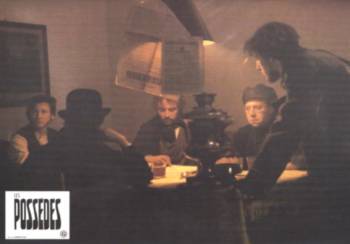 | ||||||||||
Les Possédes [The Possessed]
 fot: Renata Pajchel |
The course which the film version of The Possessed travelled from 1974 to 1984 had been long, dark and plagued with failure.
It seemed to me that I knew a fair amount about this work, more than about other novels I had transferred to the screen. Above all - this was the main source of the stage impact of The Possessed - I myself had adapted it into a play. So I had no doubt that I would be able to do it again and The Possessed would take command of the screen and of the audience. All the same, the first unsuccessful version of the scipt should have warned me, making me search for an adaptation less influenced by the theatre.
Dostojevsky's prose is theatrical, as his characters speak incessantly, driven by a desire to arrange their relationships with others and with the world by means of thoughts expressed in words. The stage is the place where much is said. Anybody who allows the characters of Dostojevsky to speak, even if he makes no attempt to stage the ideas of the dialogue, stands a fair chance to come near the essence of the issues presented in the novels of this cruelly talented writer.
Andrzej Wajda
Reviews
The position of literature and the essence of a literary work is validated only by the things which film cannot express. (...)
Of the roughly dozen films based on the novels of Dostojevsky, none seem to be satisfactory. But no, I'm being too rash. There was one, which was excellent: the filmed version of Wajda's theatrical production of Crime and Punishment. Both with respect to direction and to acting it was an absolute masterpiece. (...) Indeed, after that triumph, perhaps that is why the film The Possessed is so disappointing. (...) What is that force in Dostojevsky's writing which is so resistant to film?
Each of Dostojevsky's novels involves excellent, consistent drama, fascinating intrigue, a wealth of varied emotions. It would seem that nothing need be done but to extract and film it. And that has been done - with predictable results. Why? Because all Dostojevsky's intrigues, passions and characters live double lives: a life of reality, and a life of ideas. This literature, so firmly rooted in actual facts and urgent issues of its era, so physical as to be brutal, so real as to be vulgar, is saturated with thoughts, ideas and reflections about the world, God, religion, society, the human condition, the human soul (...) surely, any ambitious director dreams of filming Dostojevsky. But film potential is not the same as the potential of literature. Or perhaps we are all blinded by the arrogance of technology? (...) If we are not to betray and trivialise Dostojevsky, we will have to film also his philosophy, his metaphysics, his ethics. (...)
The resistance with which any work by Dostojevsky meets filming attempts clearly demonstrates what is the essence of literature, the source of its unity and greatness. For reminding us of its status, the highest in the world of art, we owe a debt of gratitude to Wajda as well as his film The Possessed. So for this, we thank him.
Zbigniew Bienkowski
"Tygodnik Kulturalny", Warsaw, 24 July, 1988
Wajda emerges from this dangerous undertaking with his honour intact, but this is not his best film. And this despite the richness of the sound track, where certain lines of the dialogue take on a form reminiscent of concrete music. And despite the quality of the images, which draw attention to the skilled use of great lighting contrasts.
Gilles Marsolais
"24 Images", Quebec, spring 1988
Fiodor Dostojevsky's novel Bracia Karamazow is available at the Merlin bookstore
Oscar | Films | Theatre | Why Japan?
Favourites | Pictures gallery | About Wajda | Bibliography
Main Page | Search | Wersja polska
Copyright © 2000 Proszynski i S-ka SA. All rights reserved